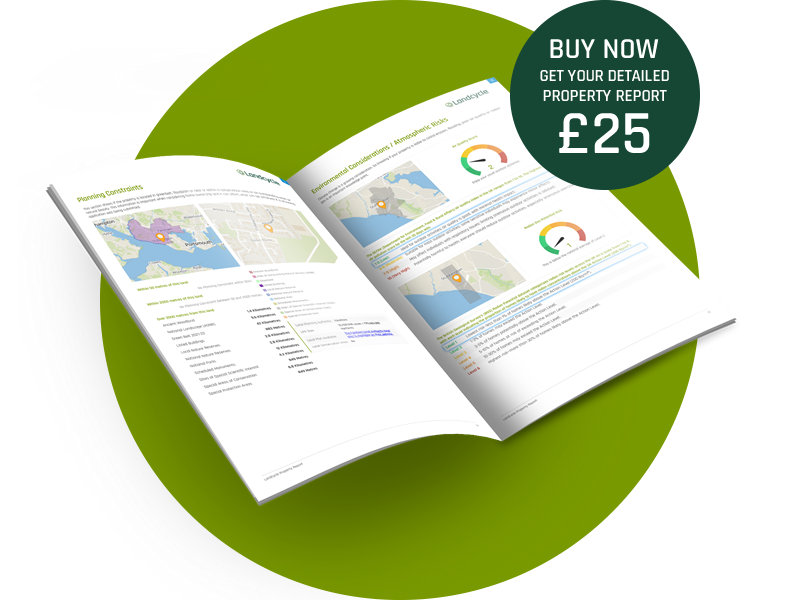
Valuable insights for key decisions
A comprehensive property report can provide valuable insights into various aspects of a property, from its environmental risks and energy efficiency to nearby amenities schools, and transport links. It helps you evaluate potential challenges such as flood zones or planning constraints and highlights opportunities to enhance sustainability and reduce costs through recommended upgrades. Beyond financial considerations, such a report offers a deeper understanding of the neighbourhood, safety, and even the long-term viability of the location for your lifestyle needs. Whether you’re planning a move, considering renovations, or simply wanting to know more about your home, this information equips you with the knowledge to make confident, well-rounded decisions.
How you can use your report
Property Purchase Decision
- Due Diligence: Use the report to gain insights about potential risks like flood zones, coastal erosion, or radon gas, which may affect long-term suitability.
- Neighbourhood Assessment: Evaluate local amenities, schools, crime rates, and transport links to determine if the property fits lifestyle needs.
- Valuation Reference: Compare the provided property valuation with the asking price to negotiate better terms.
Selling a Property
- Setting a Competitive Price: Use valuation and market activity data to set an appropriate asking price.
- Highlighting Selling Points: Showcase sustainability, energy performance, and proximity to schools or amenities in marketing materials.
Renovation or Extension Planning
- Planning Constraints: Check for restrictions like conservation areas or proximity to listed buildings to avoid planning issues.
- Energy Efficiency Improvements: Use the EPC recommendations to prioritise upgrades for better environmental impact and lower costs.
Renting a Property
- Rental Market Analysis: Assess local rental rates and average time on the market to determine optimal rent pricing.
- Tenant Attraction: Highlight proximity to transport links, schools, and low crime rates to appeal to potential tenants.
Long-Term Homeownership
- Environmental Awareness: Monitor air quality, noise pollution, and water safeguard zones to ensure a healthy living environment.
- Future Planning: Understand risks of coastal erosion or flood zones for maintenance and insurance planning.
Educational Needs
- School Proximity: Select a home based on access to high-rated schools or nurseries, factoring in walking distances.
- Specialised Education: Identify schools with special classes for children with specific needs.
Relocation Research
- Lifestyle Matching: Evaluate area safety, local amenities, and transport connectivity to ensure the new location suits personal preferences.
- Commuting Considerations: Assess road and rail proximity for daily travel requirements.
Family Planning
- Child Safety: Consider crime data, air quality, and the presence of open green spaces for child-friendly living.
- Future Educational Options: Factor in access to secondary schools and colleges for growing children.
Environmental Advocacy
- Conservation Awareness: Understand local nature reserves and Sites of Special Scientific Interest (SSSI) to engage in community environmental efforts.
- Sustainability Planning: Leverage insights about power generation and energy consumption to adopt greener practices.
Estate Planning
- Inheritance Decisions: Use the valuation and ownership details for fair division or sale of inherited properties.
- Boundary Clarity: Resolve potential disputes by referencing detailed boundary information.
DIY and Home Improvement
- Utility Planning: Use proximity to power lines and substations for DIY solar installations or energy-efficient upgrades.
- Garden Planning: Check terrain classifications and water safeguard zones to guide landscaping efforts.
Insurance Evaluation
- Risk Management: Leverage data on flood zones, crime rates, and structural risks to choose appropriate coverage.
- Premium Comparison: Use EPC and environmental data to secure better home insurance rates.
Financial Planning
- Investment Analysis: Assess property appreciation trends and rental yields to decide on buying as an investment.
- Cost Management: Use detailed energy consumption data to budget utility expenses.
Community Engagement
- Understanding Neighbours: Learn about overlapping titles or nearby planning applications to build better neighbour relations.
- Local Involvement: Engage in discussions on local developments or conservation efforts informed by planning activity data.
Legal Documentation
- Ownership Verification: Use title details to confirm legal ownership and resolve disputes.
- Boundary Disputes: Reference the report to address and settle property boundary disagreements.
Homebuyers Report
- Early Insights: Identify issues like crime data, radon gas, air quality, and boundary disputes.
- Cost-Effective: At just £25.00, flag serious concerns and potentially save upwards of £400 on an official homebuyers report.


 Consent Preferences
Consent Preferences